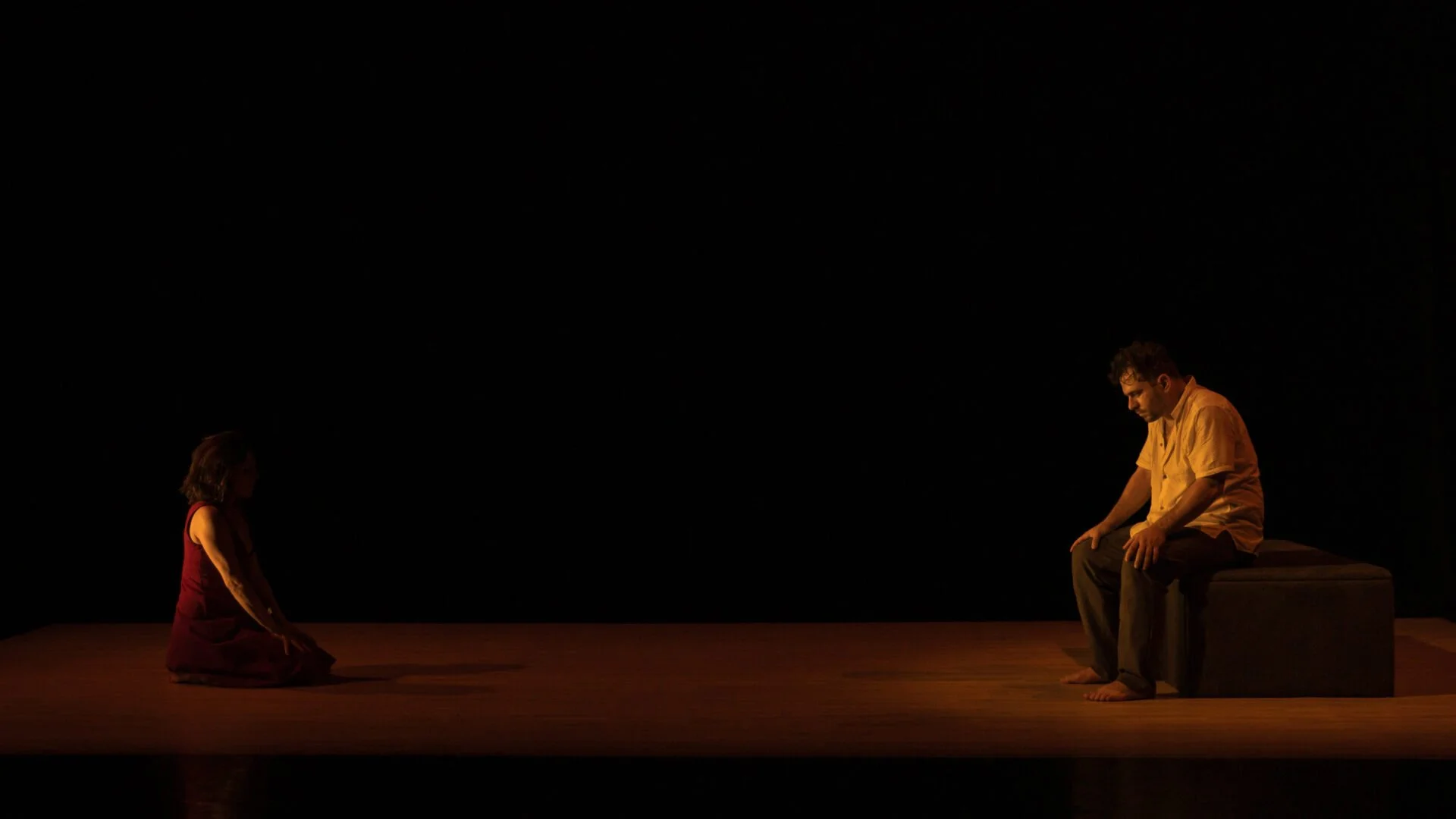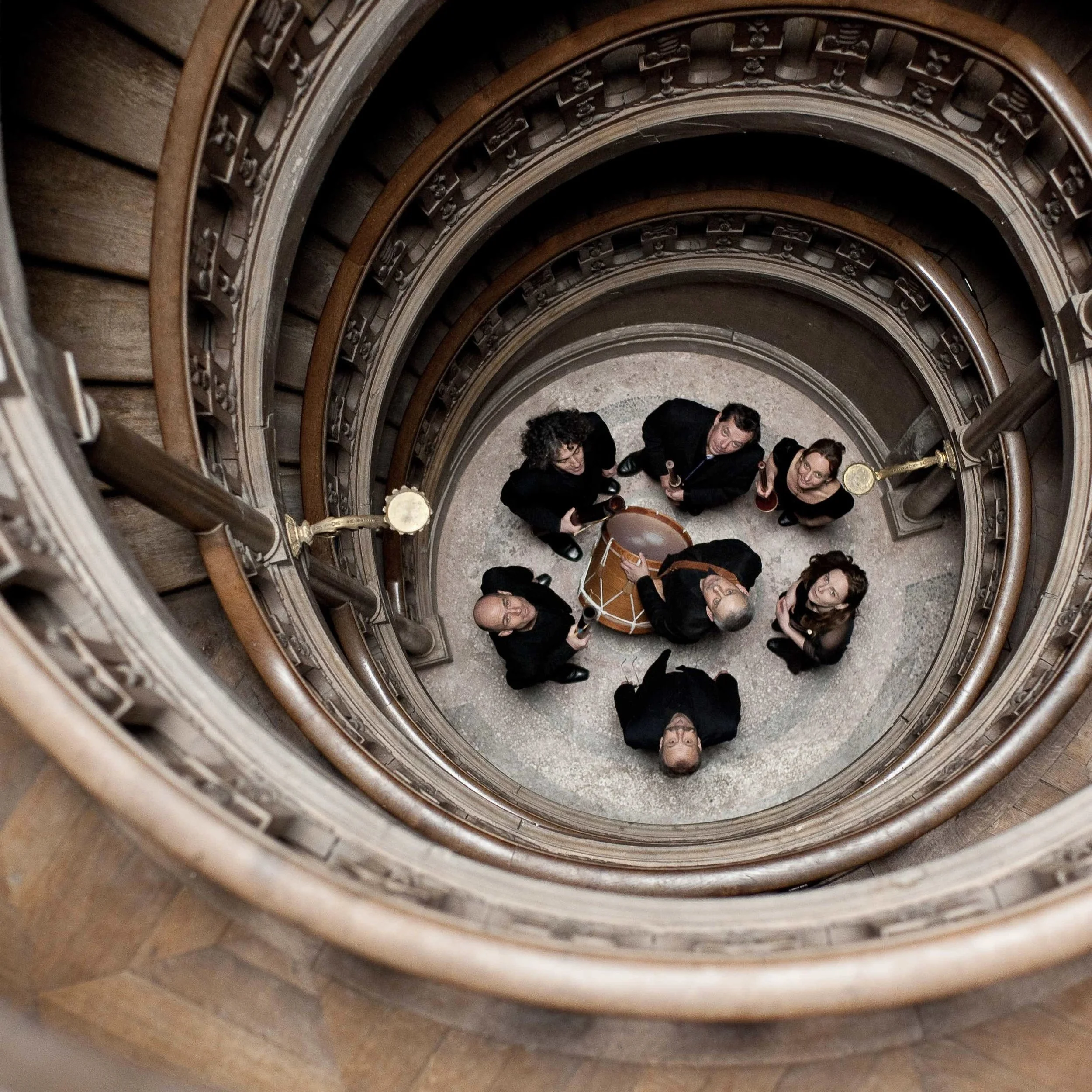Dance review: Agrimony melds indie concert, movement, and masks into spellbinding new hybrid
Sophie Dow and Laura Reznek’s meld of live music and dance created a warm, dreamlike experience

Agrimony. Photo by Max Putintsev, courtesy Sophie Dow
Agrimony was at the Scotiabank Dance Centre on September 20 and 21
IT’S SURPRISING HOW seldom contemporary dance hooks up with the live-music scene—especially when you consider how exciting the results can be. A pre-pandemic visit by Montreal’s Frédérick Gravel with the riveting Some Hope for the Bastards at the PuSh International Performing Arts Festival was the last time in recent memory that a rock concert—complete with roaring guitars and depth-charge synths—melded with adrenalized choreography for an unforgettable show.
A very different kind of magic awaited at the weekend’s Agrimony, an atmospheric, headily engaging production that joined the forces of dance artist Sophie Dow and former Vancouver-based, current U.K.-based singer-songwriter and multi-instrumentalist Laura Reznek. This was not a dance work accompanied by a band, and neither was it a concert featuring dancers; it was something else entirely its own. Agrimony grew out of Reznek’s mesmerizing 2021 full-length indie-pop album of the same name, and a deep, years-long collaboration by the two artists.
Off the top of the show, a voice over the speakers told us to turn off our cellphones as “technology has no place here” and announced “this dream lasts 55 minutes”. And a dream was exactly what this production felt like, from beginning to end, with its lush and layered music, its eerily alluring papier-mâché animal masks, and its golden-lit figures moving around a dark void. Through what felt like an album coming to vivid life, the dance and the lyrics explored identity and transformation, pain and healing, and the masks we put on and take off to survive in the world. The vibe was like a dark fairy tale undercut with raw human emotion.
One of the show’s big strengths was the band, specifically Reznek’s arresting crystalline, jazz-slurred vocals that, at moments, had shades of Cat Power and Frazey Ford—not to mention her ability to move with ease between violin, guitar, and piano. The musicianship of the band matched her talents, the four members (Jonah Ocean, Roisin Adams, James Daniel Baxter, and Chris Bede Marriott) switching adeptly between bass, cello, horns, and reverberating guitar. They built haunting, dense orchestration to back up Reznek’s beautiful voice.
On its own, the group would have put on a riveting concert, but here they became an integral part of the moving tableaux. Reznek would often step forward with her violin to become part of the action with the masked dancers—one momentarily grabbing and moving with her bow.
For their part, Amanda Testini, Tavia Christina, Mohammed Rashead, and Dow herself provided a flowing interpretation of the lyrics, looking surreal in their ram, rabbit, coyote, and barn-owl masks (beautifully crafted by Christian Borrego). At times, characters seemed afraid to put on the masks to see who they would become; at others they would free themselves of the masks—sometimes setting them up on holders that made the stylized pieces hover ghostlike over the action. The choreography moved from turbulent solos to supportive group work—at one point, a dancer fell back and back into the others’ arms while Reznek repeated the soothing words “Just rely on me, just rely on me”.
The entire evening was like a warm embrace—not surprising for a work named after a healing folk-medicine herb. It was all deeply thought out, with a photo exhibit explaining the symbology of the masks in the lobby and free herbal tea being served at the concession. Agrimony was a piece that created a different, welcoming world for an hour—and then it was time to leave the “dream” and head out into reality again. ![]()
Janet Smith is cofounder and editorial director of Stir. She is an award-winning arts journalist who has spent more than two decades immersed in Vancouver’s dance, screen, design, theatre, music, opera, and gallery scenes. She sits on the Vancouver Film Critics’ Circle.
Related Articles
Intimate duet to begin with no end explores the artists’ respective religions with care and intensity
Company 605 and T.H.E Dance Company push cross-Pacific team of dancers to embody a society rushing toward the next thing, at the Scotiabank Dance Centre
The Dust Palace’s cabaret send-up stars a visionary fashion designer who sews costumes live onstage at The Cultch
Canadian-Brazilian interdisciplinary artist brings together film and dance in a work that can be enjoyed from different angles at the Roundhouse
Marco Goecke, Crystal Pite, Sharon Eyal, and Fernando Magadan provide a whirlwind of short work for tomorrow’s next dance stars
Presented with Boca del Lupo, the accessible production by the U.K.’s Seven Circles encourages interactive learning
Aussie troupe Gravity & Other Myths’ stripped-down spectacle has been a hit around the world
Senior dance artists offer decades of insight to the new event’s joyful collaborations with younger performers
Bobbi Jene Smith and Or Schraiber share a full-evening work, and hit productions of Crystal Pite’s Frontier and Shahar Binyamini’s BOLERO X return
In the midst of an international career, the Kidd Pivot dancer is setting a short Crystal Pite work for the student showcase
Moroccan and Spanish choreographers join the international contingent of event that runs at Firehall Arts Centre and SFU Woodward’s
With the Vancouver Latin American Cultural Centre, artists Marco Esccer and Carla Alcántara celebrate the centenary of the feminist writer’s birth
Powerful dancing across the board in Medhi Walerski’s striking Last light; Bobbi Jene Smith and Or Schraiber’s straight-from-the-heart Obsidian; and Marco Goecke’s vibrating Woke Up Blind
As part of Asian Heritage Month, the gallery’s first performers-in-residence use old-school radios and headlamps in a new piece that fuses dance, multimedia, and theatre
The Dance Centre prizes carry $5,000 in funding for each artist
Fifth edition of uncurated program provides a welcoming space for artist’s first dance-theatre piece
Tickets on sale today for a Simran Sachar–Justine A. Chambers choreographic collab, comedian Kiran Deol, and Indian classical music star Alam Khan
Batsheva Dance Company alumni’s fascinating journey around the globe and onscreen finally brings them to Vancouver with Obsidian
In a surreal and outstanding conclusion to the DanceHouse season, the Belgian company warps time and gravity, toying inventively with cinematic tropes
Vancouver Playhouse performances feature choreography by Crystal Pite, Marco Goecke, Sharon Eyal, and more
New Works hosts screenings, while the Dance Centre presents performances by the likes of Vanessa Goodman, Dance//Novella, and Lesley Telford
Ashvini Sundaram takes second place in prize presented by The Hawthorne Foundation and DanceHouse
At The Cultch’s Warrior Festival, circus performers alternate between base and flyer, dismantling long-standing assumptions
Program features Vanessa Goodman/Action at a Distance, Dance//Novella, Karen Jamieson Dance, and more
Olivier Award–winning dance-theatre troupe blends physically pummelling choreography with surreal worlds that blur reality and fantasy
Former National Ballet of Canada artistic director reflects on his 2008 duet as Plastic Orchid Factory gears up to present its revival
Program includes a new creation from a sought-after choreographic duo, a remount of an acclaimed work, and a world premiere from Medhi Walerski
Vancouver choreogapher Crystal Pite has won previous Oliviers for Revisor, Betroffenheit, and Flight Path
Early Music Vancouver program features a piffari, or wind band, accompanied by the early dances of French and Italian court festivities
Offerings also include Hungary’s circus-dance company Recirquel, as well as Robert Lepage and Guillaume Côté’s visually striking take on Shakespeare’s Hamlet
































